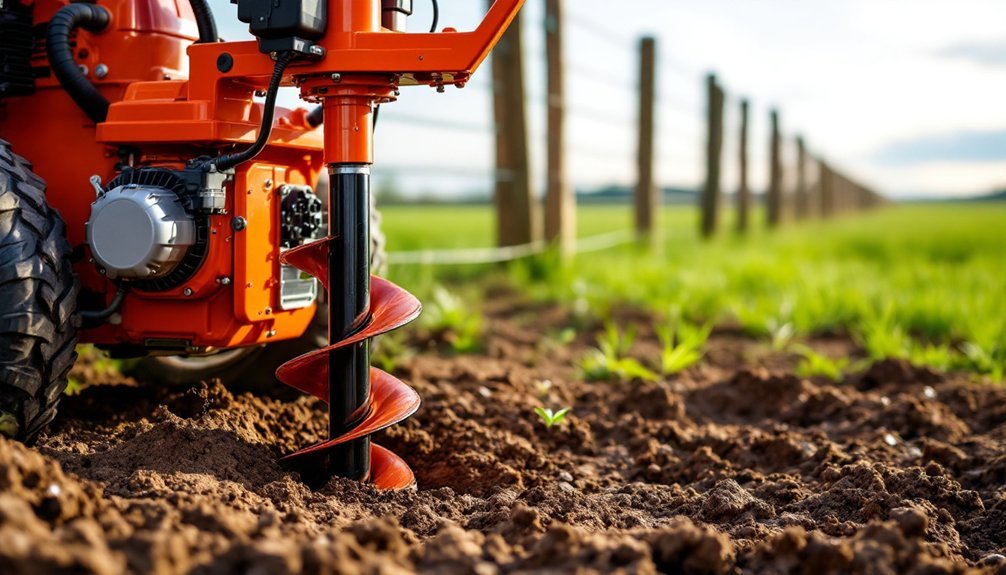You've planned your fence project carefully, but now comes the vital task—digging those post holes. The right auger can transform this backbreaking work into a manageable job, saving you hours of labor and preventing physical strain. Whether you're facing rocky soil or simple terrain, professional-grade post hole augers offer precision and power that manual digging simply can't match. Let's explore the top professional options that will help you complete your fence installation efficiently and effectively.
72cc 2200W Gas Powered Post Hole Digger with 3 Drill Bits
For serious DIYers and professional fence installers tackling substantial projects, the 72cc 2200W Gas Powered Post Hole Digger delivers impressive power and versatility. This EPA-certified powerhouse features a single-cylinder, 2-stroke engine that generates 2.2KW, making quick work of tough soil conditions.
You'll appreciate the complete package: three drill bits (4", 8", and 12") and two 24" extension rods that allow you to reach depths up to 2.6 feet without bending over. The 1.2L fuel tank supports multiple holes without refueling, while the ergonomic butterfly handles provide stability for one or two-person operation. Its high-strength manganese steel construction guarantees lasting durability.
Best For: Homeowners, professional landscapers, and fence contractors tackling medium to large projects requiring multiple post holes in various soil conditions.
Pros:
- Complete kit includes three different-sized drill bits (4", 8", 12") and two extension rods for versatile hole depths and diameters
- Powerful 72cc engine provides 2200W of digging force to handle tough soil, clay, and rocky conditions
- Ergonomic butterfly handles support both one and two-person operation with an emergency stop switch for enhanced safety
Cons:
- At 72cc, this gas-powered unit is heavier than smaller alternatives, potentially causing fatigue during extended use
- Two-stroke engine requires proper fuel/oil mixture and more maintenance than electric alternatives
- Noise and emissions may be problematic in environmentally sensitive or noise-restricted areas
XtremepowerUS 1500W Post Hole Digger Earth Auger with 6 Bit Set
DIY enthusiasts tackling large fencing projects will find the XtremepowerUS 1500W Post Hole Digger a powerful ally in their arsenal. With 1500W of power and 90 ft-lb torque, it efficiently digs through tough soil conditions including clay.
You'll appreciate the complete package—six manganese steel bits that resist corrosion and an ergonomic design with anti-skid grips that reduce vibration fatigue. Unlike gas models, this electric auger requires no maintenance and operates without fumes.
For best results, drill in stages and maintain steady pressure. When encountering obstacles, release power quickly and use complementary tools to clear debris.
Best For: DIY homeowners and serious gardeners tackling fencing, deck installation, or tree planting projects who need a powerful, low-maintenance alternative to manual post hole digging.
Pros:
- Powerful 1500W motor with 90 ft-lb torque efficiently cuts through tough soil conditions including clay
- Complete package includes six manganese steel bits that resist corrosion and rust
- Electric operation means no engine maintenance, no fumes, and quieter operation than gas models
Cons:
- Can bind or jerk unexpectedly when hitting rocks or large roots, requiring careful handling
- Limited to locations with access to power outlets or requiring extension cords
- Some users may find the weight challenging during extended use despite the ergonomic design
VEVOR 52cc Gas Powered Post Hole Digger with Earth Auger Drill Bits
The VEVOR 52cc Gas Powered Post Hole Digger stands out as a professional-grade solution for homeowners tackling extensive fencing projects on varied soil types. Its robust 52CC engine delivers impressive power at 320RPM while the alloy gearbox handles tough terrain effectively.
You'll appreciate the thoughtful design features including shock-absorbing foam handles, a 1.2L fuel tank for extended operation, and an emergency stop switch for safety. The package includes two drill bits (6" and 10") and extension rods that help you maintain proper posture during operation.
With a 4.3-star rating, most users praise its power and efficiency, though some mention challenges with rocky soil.
Best For: Homeowners and DIY enthusiasts tackling fence installation, deck posts, or tree planting projects who need a powerful tool to handle various soil conditions without hiring professional equipment.
Pros:
- Powerful 52CC engine with 320RPM drill speed effectively handles multiple soil types while the 1.2L fuel tank allows for extended operation without frequent refueling
- Complete kit includes both 6" and 10" drill bits with extension rods, providing versatility for different project needs right out of the box
- Ergonomic design features like shock-absorbing foam handles and emergency stop switch enhance both comfort and safety during operation
Cons:
- At 42.5 pounds, the unit is relatively heavy which may cause fatigue during extended use, especially for smaller users
- Some customers report difficulties with initial starting procedure and problematic choke placement
- Performance may significantly decrease in rocky or clay-heavy soil conditions, potentially requiring additional tools or effort
DC HOUSE 52cc Gas Powered Post Hole Digger with Two Drill Bits
Serious fence builders who need power and versatility will find the DC HOUSE 52cc Gas Powered Post Hole Digger exceptionally valuable. Its robust 1800W engine tackles even compacted clay soil with ease.
You'll appreciate the complete package: two auger bits (6" and 10") plus extension rods that reach 2.6 feet deep. The ergonomic butterfly handles and emergency stop switch enhance safety during operation.
While some users report initial starting challenges, the digger performs reliably after warm-up. Remember to pull up regularly to prevent binding in root-filled areas. For peak performance, maintain a 1:25 oil-to-gas ratio and empty the tank before storage.
Best For: Homeowners and contractors who need to dig multiple holes quickly for fences, decks, or landscaping projects in challenging soil conditions.
Pros:
- Powerful 52cc engine efficiently cuts through compacted clay and tough soil, reducing manual labor
- Complete kit includes two auger bits (6" and 10") and extension rods for versatile digging applications
- Safety features like emergency stop switch and ergonomic handles make operation more secure
Cons:
- Initial starting difficulties reported by some users, requiring patience during warm-up period
- Can get stuck in areas with heavy roots or rocks, needing frequent lifting during operation
- Some customers have experienced throttle issues that could lead to potential safety concerns
Hand Auger Post Hole Digger with Adjustable T-Handle
For homeowners seeking a reliable manual solution without the noise and maintenance of power equipment, Leriton's Hand Auger Post Hole Digger delivers impressive performance with its adjustable T-handle design.
At just 7.78 pounds, this 46-inch digger features hardened steel blades with a 6-inch point spread that efficiently cuts through soil. You'll appreciate the non-slip hardwood T-handle that reduces fatigue during extended digging sessions. It arrives fully assembled and ready for immediate use.
Customer ratings of 4.8/5 stars confirm its effectiveness for fence posts, deck installations, and tree planting. If you're tackling a smaller project and prefer manual control, this affordable tool offers professional-grade quality without the complexities of gas-powered alternatives.
Best For: Homeowners and DIY enthusiasts working on smaller fence, deck, or planting projects who prefer manual tools over powered equipment.
Pros:
- Lightweight design (7.78 pounds) with ergonomic hardwood T-handle reduces hand fatigue during extended use
- Arrives fully assembled with hardened steel blades that effectively cut through soil
- High customer satisfaction (4.8/5 stars) confirms reliable performance for residential projects
Cons:
- Manual operation requires more physical effort than powered alternatives
- 6-inch point spread may be limiting for larger post holes or projects
- Not ideal for heavy-duty commercial applications or hard/rocky soil conditions
Factors to Consider When Choosing the Most Professional Post Hole Auger for Efficient Fence Installation
Selecting the right post hole auger for your fence project requires careful consideration of power sources, appropriate auger sizes, and compatibility with your specific soil type. You'll need to weigh the trade-offs between highly portable models versus more durable options that can withstand repeated use across larger properties. Your decision should also account for the maximum depth capacity needed for your fence posts, as insufficient depth can compromise the entire structure's stability.
Power Source Options
The two primary power sources for professional post hole augers present distinct advantages depending on your specific fencing project requirements. Gas-powered models deliver superior torque with their two-stroke engines, making them ideal for tackling tough soil and creating larger, deeper holes. They're your best option for remote locations without electricity access.
Electric augers offer a different set of benefits—they're quieter, lighter, and produce zero emissions, making them perfect for residential areas where noise and air quality are concerns. You'll also save money long-term with electric models due to lower maintenance requirements and no fuel costs.
Your choice should ultimately depend on your work environment, hole specifications, and operational preferences. For heavy-duty, remote projects, gas provides the power you need, while electric models excel in accessible, noise-sensitive settings.
Auger Size Requirements
Choosing the right auger size stands as the most critical decision you'll make when selecting a post hole auger for your fence installation project. Common diameters range from 4 to 12 inches, with larger sizes ideal for substantial posts and smaller ones sufficient for lightweight applications.
Consider your specific project needs—standard augers typically drill holes up to 2.6 feet deep, providing essential stability against wind and soil movement. Your soil type will also influence your selection; softer soils accommodate larger bits without issue, while rocky or clay soils may require smaller diameters to prevent binding.
For maximum efficiency, match your auger precisely to your project's depth and width requirements. This targeted approach will considerably reduce installation time and effort, allowing you to complete your fence project with professional results.
Soil Type Compatibility
When evaluating post hole augers for your fence installation, soil composition stands as the definitive performance factor that can make or break your project's efficiency. For tough clay or rocky terrain, you'll need an auger with a high-torque motor and specialized bits made from high-strength materials to prevent stalling and damage.
Variable speed controls offer essential versatility, allowing you to adjust drilling power based on changing soil conditions you encounter. If you're working with cohesive soils, consider selecting larger bit sizes that remove more material per pass for wider fence posts or deeper holes.
Don't overlook weight considerations—lighter augers provide better maneuverability in dense or uneven terrain where challenging soil types might complicate your digging process, while heavier models offer stability in looser soils.
Portability Vs Durability
Balancing portability against durability creates one of the most essential tradeoffs you'll face when selecting a professional post hole auger for fence installation. Lighter electric models offer superior mobility between job sites but may struggle with rocky terrain and extended use.
Gas-powered augers deliver exceptional digging power through tougher soil conditions at the cost of added weight and reduced transportability. When evaluating your options, consider the materials used—high-strength manganese steel bits and welded steel handles greatly enhance longevity and resistance to wear.
Your decision should reflect your specific needs: if you'll be moving frequently between locations, prioritize a lightweight design without compromising too much on material quality. For demanding projects in challenging soil, you might sacrifice some portability for the durability of heavier-duty components that will withstand rigorous, repeated use.
Depth Capacity Analysis
Depth capacity represents the third critical factor when evaluating professional post hole augers for fence installation. Most standard models can reach depths of about 2.6 feet, which is sufficient for basic fence posts in normal conditions. However, you'll need to assess if this meets your specific requirements.
For challenging projects, consider electric or gas-powered augers with capabilities of up to 29 inches or more. Remember that your bit selection impacts achievable depth—larger bits encounter more resistance, potentially limiting how deep you can drill, especially in tough soil.
Look for models featuring extension rods, which allow deeper digging without uncomfortable bending. Finally, evaluate your soil conditions carefully; harder soils may require less depth for stability, while softer terrain might demand deeper post placement for adequate support.
Safety Features Assessment
Professional post hole augers require critical safety evaluations before purchase, as these powerful tools can pose significant risks during operation. You'll want to prioritize models with built-in safety lock functions that prevent accidental activation while you're positioning or transporting the auger.
Look for an emergency stop switch that allows immediate shutdown when you encounter unexpected obstacles or hazardous situations. Ergonomic designs featuring non-slip handles are essential for maintaining proper control, especially in wet or muddy conditions.
Carefully assess torque and speed control capabilities, as proper regulation helps prevent injury from sudden binding on underground obstructions. The best professional augers also include thorough operational guidelines that clearly communicate proper usage techniques and potential hazards. These instructions are particularly valuable if you're new to operating power equipment or training other workers.
Price-Performance Ratio
When evaluating post hole augers for fence installation, the price-performance ratio becomes a critical decision factor that can greatly impact your project's efficiency and budget. You'll want to assess how the auger's power specifications align with its cost—higher wattage models typically offer better performance in tough soil conditions, justifying their premium price.
Consider the value added by included accessories like multiple bit sizes and extension rods, which enhance versatility without requiring additional purchases. Factor in long-term considerations such as maintenance requirements, weight, and starting mechanisms that affect usability over time.
Don't overlook customer reviews when determining value—real-world experiences often reveal performance insights that specifications alone can't convey. The best investment isn't necessarily the cheapest option, but rather the auger that delivers reliable performance proportionate to its price point.
Frequently Asked Questions
How Do I Maintain My Post Hole Auger for Long-Term Durability?
To maintain your post hole auger's durability, clean dirt off after use, lubricate moving parts regularly, sharpen blades when dull, store in a dry place, and inspect for damage before each use. Don't forget routine engine maintenance.
Can Post Hole Augers Be Used in Rocky or Clay Soil?
Yes, you can use post hole augers in rocky or clay soil, but you'll need one with strong metal bits. For rocky terrain, consider a power auger, while clay soil requires sharp blades and adequate moisture.
What Safety Equipment Should I Wear When Operating an Auger?
You'll need a hard hat, safety glasses, ear protection, steel-toe boots, gloves, and fitted clothing. Don't wear loose items that could catch. Always follow manufacturer's safety guidelines when operating an auger.
How Deep Can Most Professional Post Hole Augers Dig?
Most professional post hole augers can dig between 3-4 feet deep, though some models reach up to 6 feet. You'll find this sufficient for standard fence posts, which typically require 2-3 foot holes.
Are Electric Augers as Powerful as Gas-Powered Models?
No, electric augers typically aren't as powerful as gas-powered models. You'll find gas augers deliver more torque for tough soil conditions, while electric units offer convenience but less power for heavy-duty digging tasks.





Leave a Reply